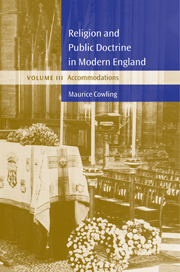Book contents
- Frontmatter
- Contents
- Foreword and acknowledgements
- Introduction
- I The Christian intellect and modern thought in modern England
- 1 The reanimation of Protestantism I
- 2 Christianity and literature I
- 3 The reanimation of Protestantism II
- 4 The enlargement of Christianity
- 5 Christianity and literature II
- 6 Christianity and modern knowledge I
- 7 Whiggism, Liberalism and Christianity I
- 8 Whiggism, Liberalism and Christianity II
- 9 Christianity and modern knowledge II
- 10 Christianity in an unfriendly world I
- 11 Christianity in an unfriendly world II
- 12 Christianity in an unfriendly world III
- 13 Christianity in an unfriendly world IV
- 14 Christianity in an unfriendly world V
- II The post-Christian consensus
- III Conclusion: religion and public doctrine in modern England
- Notes
- Index of proper names
8 - Whiggism, Liberalism and Christianity II
Published online by Cambridge University Press: 23 December 2009
- Frontmatter
- Contents
- Foreword and acknowledgements
- Introduction
- I The Christian intellect and modern thought in modern England
- 1 The reanimation of Protestantism I
- 2 Christianity and literature I
- 3 The reanimation of Protestantism II
- 4 The enlargement of Christianity
- 5 Christianity and literature II
- 6 Christianity and modern knowledge I
- 7 Whiggism, Liberalism and Christianity I
- 8 Whiggism, Liberalism and Christianity II
- 9 Christianity and modern knowledge II
- 10 Christianity in an unfriendly world I
- 11 Christianity in an unfriendly world II
- 12 Christianity in an unfriendly world III
- 13 Christianity in an unfriendly world IV
- 14 Christianity in an unfriendly world V
- II The post-Christian consensus
- III Conclusion: religion and public doctrine in modern England
- Notes
- Index of proper names
Summary
Fitzjames Stephen's' father was an important civil servant, Professor of Modern History at Cambridge and a Clapham Evangelical. At Eton and King's College, London, Fitzjames himself was a talented performer and was prominent in both the Cambridge Union and the Apostles. After performing indifferently in the classics and mathematics required by Cambridge in the 1840s, however, he decided not to offer himself for a Fellowship. He also decided against ordination and in favour of the Bar, and spent the next decade or so building up a legal practice, writing prolifically in quarterly magazines, and combining the two activities in the statement of Anglican latitudinarianism which he made in the course of defending the Reverend Rowland Williams during Williams's trial in the Court of Arches.
When published as a book in 1862, The Defence of the Reverend Rowland Williams asserted that the questions at issue in Williams's trial were whether ‘the law of England’ forbade the Anglican clergy to ‘use their minds’, whether the Church of England was a ‘voluntary association’ whose doctrines were ‘regulated … by public opinion’ or a Church whose ‘doctrines were established and regulated by law’, and whether, by law as distinct from ‘the public prejudice of a majority of the laity’, Williams was forbidden to express the opinions he had expressed in discussing Bunsen's Biblical Researches in Essays and Reviews. The conclusions were that Williams had completed the work begun by the Gorham Judgement, that, so far as ‘legal penalties’ were concerned, the clergy were now at liberty to criticize ‘every part of the Bible’, and that ‘rationalistic views’ about the Bible no longer suffered the stigma of illegality.
- Type
- Chapter
- Information
- Religion and Public Doctrine in Modern England , pp. 174 - 216Publisher: Cambridge University PressPrint publication year: 2001



